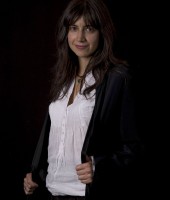Lavinia Maddaluno
Lavinia Maddaluno is Assistant Professor in Early Modern History at the Department of Humanities at Ca’ Foscari University of Venice. She is a historian of early modern Europe interested in the interconnections between societies, environments and political economy. Her research comprises three interrelated yet distinct lines of inquiry. The first, stemming from her PhD (Cambridge, 2018) and first book, explores political economy and scientific practices in the Enlightenment, rethinking 18th-century political economy as a practice brought about not only by the major figures of the Enlightenment, but also by less prominent actors. Her second area of research concerns environmental history, particularly focusing on "unruly ecologies" and examining the connections between the historical narratives of water and food production, with a specific emphasis on rice cultivation in Europe during the sixteenth and seventeenth centuries. The third area, which she will begin to develop at the IEA, is about the construction of the idea of scarcity and processes of knowledge making in the 18th-century Atlantic. Prior to Venice, Lavinia held various fellowships, among which a Max Weber Fellowship, a Warburg/I Tatti Fellowship and a short-term fellowship at the Fondation Maison des Sciences de l’Homme.
In September 2025, Lavinia Maddaluno she joins the Paris IAS for a ten-month research stay.
Research topics
Early Modern History; European History; History of Science; Environmental History.
"L’art de convertir les vivres en pain": scarcity, technology and hybrid knowledge in the eighteenth-century Portuguese and French Atlantic
The project explores the problem of food scarcity from the point of view of the history of science, investigating what kind of knowledge was mobilised to address scarcity in the Portuguese and French Atlantic in the second half of the 18th century. It centers on two spaces characterized by extreme environmental constraints: the French colony of Saint-Domingue, and the Amazon estuary in Brazil. While Europe faced the challenge of feeding a growing population amid poor harvests and liberalizations in the grain trade, Saint-Domingue and Brazil confronted the additional challenge of feeding their enslaved labor-force. The project asks the following questions: How was the idea of food scarcity constructed in ecologies as diverse as Amazonian riverbanks and islands, or the Saint Domingue sugar plantation plains? What kind of knowledge(s) were applied to overcome shortages of dominant crops such as cassava and wheat in non-European territories? And how were environmental concerns tackled in forms of colonial extractivism and local agricultural practices?
Whether real or perceived, scarcity was a constant concern for both colonial and non-colonial societies. It sparked debates about climate, soil potential, the role of human agency and technology in harnessing natural resources, strategies for economic growth, self-sufficiency, and population management. By adopting methodologies from various fields and relying on a wealth of archival material, this project aims to recover the knowledge and practices—environmental, agricultural, gendered, hybrid, mechanical and entrepreneurial—that were developed to address scarcity, along with the actors involved, both European and not.
Key publications
Lavinia Maddaluno. “‘Malignità che s’infonde’: rice, medicine and liminality in Counter-Reformation Milan”, in John Henderson et Sandra Cavallo (eds.) Medicine in Early Modern Italy: between theory and practice, 1500-1700. Brepols, forthcoming.
Lavinia Maddaluno. Science and Political Economy in Enlightened Milan (1760-1805). The Voltaire Foundation, Oxford University Studies in the Enlightenment, Liverpool University Press, 2024.
Lavinia Maddaluno. "Forests, woods, roads: Agricultural landscapes as instruments for the material administration of an eighteenth-century Tuscan periphery", in Corey Tazzara, Paula Findlen et Jacob Soll (eds.), Florence after the Medici. Londres, pp. 199-223, 2020.
|
Lecture by Lavinia Maddaluno (Ca’ Foscari Venice, Paris IAS) during the study day organized by Damiano Bardelli (EHESS-CRH). Open to the public. Lecture by Lavinia Maddulano (Université Ca' Foscari de Venise, Paris IAS) organised by the Department of Economics and Management of the University of Pisa. Open to the public. |
|
|
|
|




